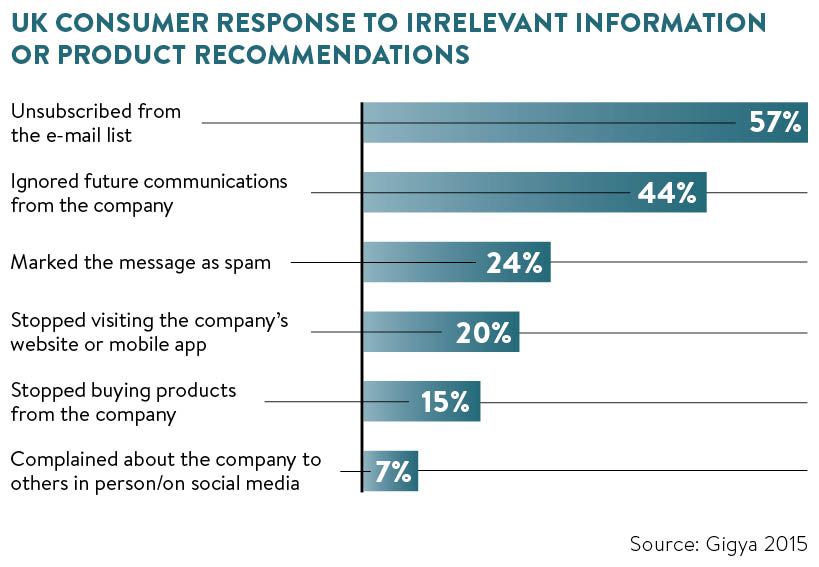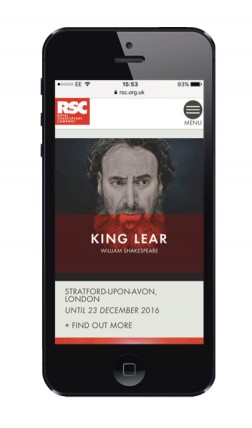The new “expectation economy” is consumer-led and data driven. Customers these days demand as much of a personalised service from digital suppliers as they used to from the corner shop. But they also now expect to be able to control it.
Companies not offering personalised digital experiences are missing out, but those adopting too much of a Big Brother pose risk alienating consumers. It’s a fine line and one that businesses are treading carefully.
Scott Symonds, managing director of media at ideas and innovation agency AKQA, says: “I think of personalisation as respecting the relationship we have with the consumer by recognising and honouring the level of investment they have made to our client brands. The attractive by-product of creating more relevant and respectful marketing moments is that it qualitatively builds brand consideration and enhances the business/revenue return on investment from a performance perspective.”
Some marketing is still stuck in the 20th century broadcast age, says Mr Symonds, “with overly generalised messaging shouted out to under-differentiated audiences. This limits consumer engagement,” he says.
Products have become increasingly commoditised, and “this requires organisations to shift their focus towards ensuring the customer experience becomes their biggest differentiator,” says Mike Blanchard, SAS’s head of customer intelligence solutions for UK & Ireland.
Previously, the customer-experience journey was a string of static, one-dimensional encounters. But now, thanks to big data and the resulting innovations, customer experiences can be a seamless exchange over different channels between people and the organisations with which they choose to do business.

Data at the heart
At the heart of this approach, says Mr Blanchard, “is using data to understand what drives the customer and what doesn’t through holistic customer intelligence”.
But delivering a data-driven customer experience doesn’t happen overnight. It requires a mix of activities and competencies, from data integration to technology implementations, to training and rethinking processes.
Brands need to serve up the right offers at the right time via the right channel
“What is becoming clear is demand from the always-on consumer for more personal and relevant communications,” says Mr Blanchard. “Brands need to serve up the right offers at the right time via the right channel.” This could be an offer for a product that is highly targeted and appears straightaway on a smartphone screen, without the need for endless scrolling to find a more suitable item.
 Today’s customer journey requires a combination of individualised insights and connected interactions, as well as an agile approach. It’s not enough to be doing the same things via new channels.
Today’s customer journey requires a combination of individualised insights and connected interactions, as well as an agile approach. It’s not enough to be doing the same things via new channels.
With consumer data flooding in across mobile, social, e-mail and wearable technologies, it can be difficult for businesses to navigate the big data landscape and use it effectively to personalise messaging.
Gigya’s 2015 State of Consumer Privacy & Personalisation survey found that 44 per cent of UK consumers ignore all future communications from brands that do not target them correctly.
“To manage data effectively and gain customer loyalty, organisations must move beyond anonymous and siloed user data to create known, unified profiles that power one-to-one customer relationships,” says Richard Lack, Gigya’s Europe, Middle East and Africa director of sales. “The answer is seeing people, not just numbers, all based on digital identity. By identifying site visitors at the point of site entry via registration and social authentication, businesses can tie demographic, interest and behavioural data to individual user identities.”
The benefit of properly collecting, organising and leveraging consumer data is simple, says Mr Lack. “Brands that use actionable, permission-based data to provide personalised, relevant offers and experiences will develop an in-depth understanding of their respective customer bases and be rewarded with significantly higher conversion rates and longer-lasting customer relationships,” he says.
Personalisation
The Royal Shakespeare Company (RSC) operates three theatres at its Stratford-upon-Avon home. In 2014, the company decided to upgrade the RSC website and overall its digital brand in response to the growth of mobile and overall changing customer behaviour. This meant creating an all-new responsive website that would, in time, provide a completely unique and personalised experience for each customer.
It has done this using Progress’s Sitefinity web content management system, which allows it to develop a complete picture of users and serve them with individual content based on past behaviour and individual profile. The platform has also allowed the RSC to track the return on investment on individual marketing assets and their effectiveness on different demographics, for example learning that video trailers are more effective on new customers than existing ones.
Richard Adams, RSC’s digital programme manager, says: “Our customers come to the RSC and expect the world’s best theatre, so the rest of our brand needs to reflect that. Working with Sitefinity has allowed us to make our digital presence more engaging and more personal.”
Personalisation is an art, says Rachel Barton, managing director of advanced customer strategy at Accenture Strategy. “There is a fine balance between knowing too much about your customers and acting on it – at which point the brand can feel ‘creepy’ – compared with knowing too little and spamming all customers with the same untailored offers and messages, which can also be frustrating,” she says.

The Royal Shakespeare Company upgraded its website to serve customers with individual content based on past behaviour and individual profiles
Brands that successfully deliver personalised experiences already have a trusted relationship with their customers. Ms Barton adds: “When customers fully trust a company, they will impart huge amounts of personal and behavioural information, which can help brands build longer-term loyalty, as opposed to purely transactional relationships.”
Brands hold details such as your buying habits, your interests, your friends’ interests, where you’ve been on holiday or where you might be going on holiday. But what matters, says Dr Mark K. Smith, chief executive of business communication company ContactEngine, is: “Organisations hold one ‘single you’ where all your data is held in one place, not fractured across different silos.
“When that happens then communications can be both reactive, instantly resolving customer issues with the minimum of fuss, and proactive where organisations can begin to predict what you might want from a relevant product or to warn you of an outcome that you won’t like, such as a large bill.”
It’s also about not abusing the information exchange. According to Accenture Strategy’s 11th annual Global Consumer Pulse Research, just 9 per cent of UK consumers strongly trust the companies they do business with to do the right thing with their personal information. However, 36 per cent would be willing to share personal information if it resulted in more tailored, personalised experiences.
AKQA’s Mr Symonds concludes: “Personalisation should feel like concierge service, not creepy. We like it when our local restaurant remembers our name and favourite dish. We like it when Amazon recommends something that we actually do have interest in. We do not like it when we see a banner 100 times in a week for an item we left in an online shopping cart because we did not want it after all.”
CASE STUDY: FIAT
To celebrate Valentine’s Day, car-maker Fiat commissioned Mullen Lowe and KR Media to develop a fun, tongue-in-cheek digital brand campaign to launch the new Fiat 500 in France.
 The campaign began by initially targeting women who had shown an interest in the Fiat 500 ahead of the launch. These women were shown ads which encouraged them to visit the Fiat 500 website where they could find further information. With Valentine’s Day approaching, on visiting the website, each woman was invited to enlist Fiat’s help persuading their partners to buy them a new car.
The campaign began by initially targeting women who had shown an interest in the Fiat 500 ahead of the launch. These women were shown ads which encouraged them to visit the Fiat 500 website where they could find further information. With Valentine’s Day approaching, on visiting the website, each woman was invited to enlist Fiat’s help persuading their partners to buy them a new car.
Participants were invited to enter their partner’s e-mail address, a pet nickname that was personal to their relationship, another personal message and also a picture of themselves. This additional information was then used to deliver a creative, personalised campaign to each of the women’s partners.
Each partner was sent an e-mail so they could provide consent to be involved in the campaign. Using ADventori technology, the men were targeted with personalised ads, including images of their partner and pet names.
“With such a personalised campaign, it’s vital to protect consumers’ privacy, so for this reason, the campaign was done as a strictly opt-in exercise,” says Will Bishop, ADventori’s country manager. “The ADventori technology ensured privacy by storing all the personal information belonging to each consumer in a cookie stored on their device. It also gave the consumer full control to opt out of the campaign as they could delete the cookie at any time.”
The campaign drove 237 consumers to the Fiat 500 website and secured an incredible 26 car pre-orders from men who were tracked in just the first week of the campaign.
